
The Easybeats were an Australian rock band that formed in Sydney in late 1964. They enjoyed a level of success that in Australia rivalled The Beatles. They became the first Australian rock act to score an international hit, with the 1966 single "Friday on My Mind", as well as one of the few in Australia to foreground their original material.

George Redburn Young was an Australian musician, songwriter and record producer. He was a founding member of the bands the Easybeats and Flash and the Pan, and was one-half of the songwriting and production duo Vanda & Young with his long-time musical collaborator Harry Vanda.
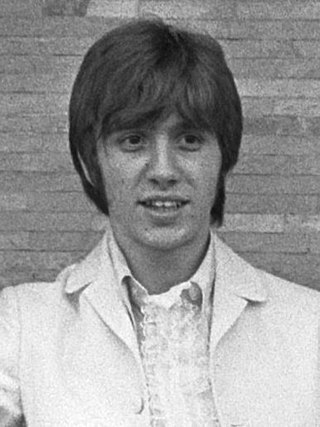
Stephen Carlton Wright was an Australian singer, songwriter, and musician. Called Australia's first international pop star, he is best known for being the lead singer of the Easybeats, who are widely regarded as the greatest Australian pop band of the 1960s.
"Evie" is a rock song performed by Australian singer and former frontman of the Easybeats, Stevie Wright. It was written by Harry Vanda and George Young and released as a single in 1974. It has been suggested that it is the first 11-minute song to chart at #1 anywhere in the world.

Easy is the debut studio album by the Australian rock band the Easybeats, released on 23 September 1965.

Volume 3 is a studio album by the Australian rock band The Easybeats, released on 3 November 1966. It was the third and final album from the group recorded in Australia before relocating to England.

The Best of The Easybeats + Pretty Girl is the first compilation album by The Easybeats featuring a selection of songs recorded by the group between 1965 and 1966. The album was originally released in Australia and New Zealand under the Parlophone label under the then current licensing arrangement by the band's production company Albert Productions.

Vigil is the fifth studio album by Australian rock band The Easybeats, released in May 1968. This would be the second and final album by the band released on the United Artists Records label.
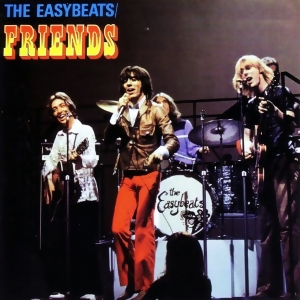
Friends is the sixth and final studio album by Australian rock band the Easybeats. It was released in early 1970 as part of the group's new recording contract with Polydor Records. It would be the only album Polydor released of the band as they broke up before its release.

Vanda & Young were an Australian songwriting and producing duo composed of Harry Vanda and George Young. They performed as members of 1960s Australian rock group the Easybeats where Vanda was their lead guitarist and backing singer and Young was their rhythm guitarist and backing singer. Vanda & Young co-wrote most of the Easybeats' later hits including their international hit "Friday on My Mind" and they were the record producers for the group from 1967. Young was the older brother of Malcolm and Angus Young of the hard rock band AC/DC and also the record producer behind several of the band's biggest albums. The "Guitar George" and "Harry" who are mentioned in the Dire Straits hit song "Sultans of Swing" are George Young and Harry Vanda.
"Bring a Little Lovin'" is a song written by Harry Vanda and George Young of the Australian rock group The Easybeats. The song was written for the Spanish band Los Bravos. Their version was released as a single in April 1968 and reached number fifty-one on the Billboard Hot 100 in the United States.

Good Friday is the fourth studio album by The Easybeats, released in May 1967. It was the first album released after the band signed an international recording deal with United Artists Records. The original UK album was released in May 1967. Although "Friday on My Mind" was a big single in the UK, the album failed to make the top 40.
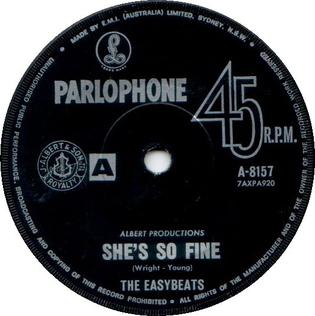
"She's So Fine" is a song written by Stevie Wright and George Young. It was originally recorded by the Australian rock group the Easybeats in 1965, whose version reached number three in the Australian charts.

"Who'll Be the One" is a song written by Harry Vanda and George Young. It was originally recorded by the Australian rock group the Easybeats in 1967. The song was a follow up to their successful single "Friday On My Mind". The single was a flop in the U.K., but it reached #12 on the Go-Set charts in Australia

"The Music Goes 'Round My Head" is a 1967 song and single by Australian rock group The Easybeats, which was written by band members George Young and Harry Vanda.

"For My Woman" is a song by Australian rock band the Easybeats, written by singer Stevie Wright and guitarist George Young. The Easybeats had formed in Sydney in 1964, with a sound inspired by the Pretty Things and the Rolling Stones. After signing with their manager Mike Vaughan, he introduced the band to producer and businessman Ted Albert, who liked them enough to sign with his company Albert Productions in December 1964. The song was recorded in January 1965 at the 2UW Theatre in Sydney as a demo together with three other songs.
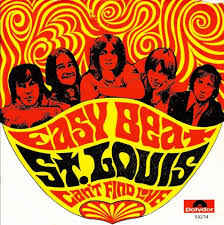
"St. Louis" is a song by Australian rock group the Easybeats, which was released in June 1969. It was co-written by its members Harry Vanda and George Young and recorded as their first single after signing to Polydor Records.

"Come and See Her" is a song written by Stevie Wright and George Young. It was released as the sixth single for their Australian rock group the Easybeats in April 1966, which reached No. 3 on the Australian charts. It was the group's debut single in the United Kingdom, issued on the United Artists Records in July.
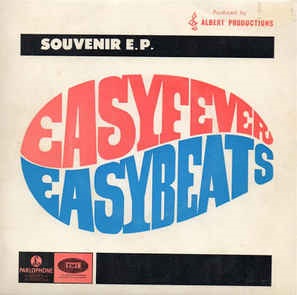
Easyfever by Australian rock and roll group the Easybeats was their fourth official extended play. It was issued to coincide with the band's departure for the United Kingdom. It appeared in August 1966 and reached number one on the Australian singles charts, something that had only been achieved once before by an EP. The songs on the EP did not appear on any of the Easybeats' official studio albums, however, they were included as bonus tracks on the 1992 CD reissue of their It's 2 Easy album.

"Sad and Lonely and Blue" is a song written by Stevie Wright and George Young, recorded by their band the Easybeats in 1965. The song was written in response to the group being labelled as "pop musicians" from their previous singles "She's So Fine" and Wedding Ring" along with their debut album Easy. The song is based around a 12-string guitar riff played by guitarist Harry Vanda and sees influences in both British rhythm and blues and jangle pop. Released as a single on 4 November 1965, it was a chart failure compared to their previous releases, only reaching number 21 on the Kent Music Report.


















